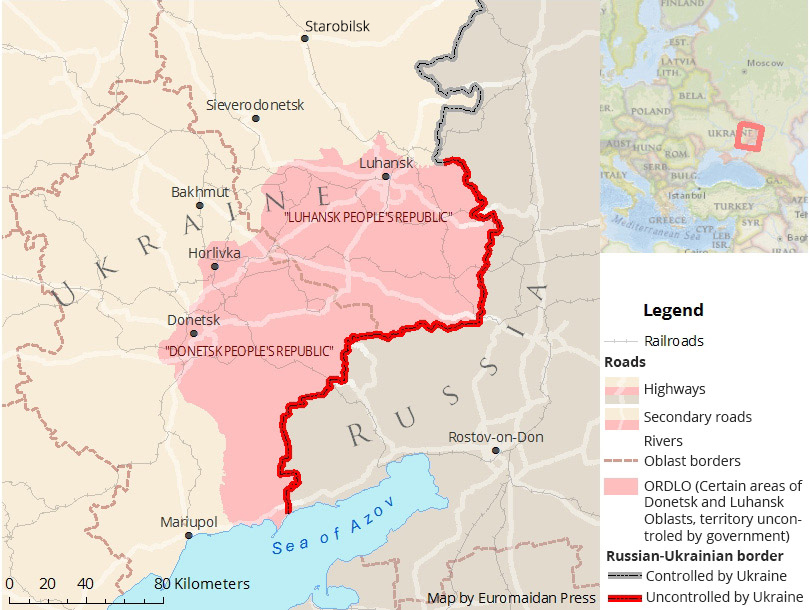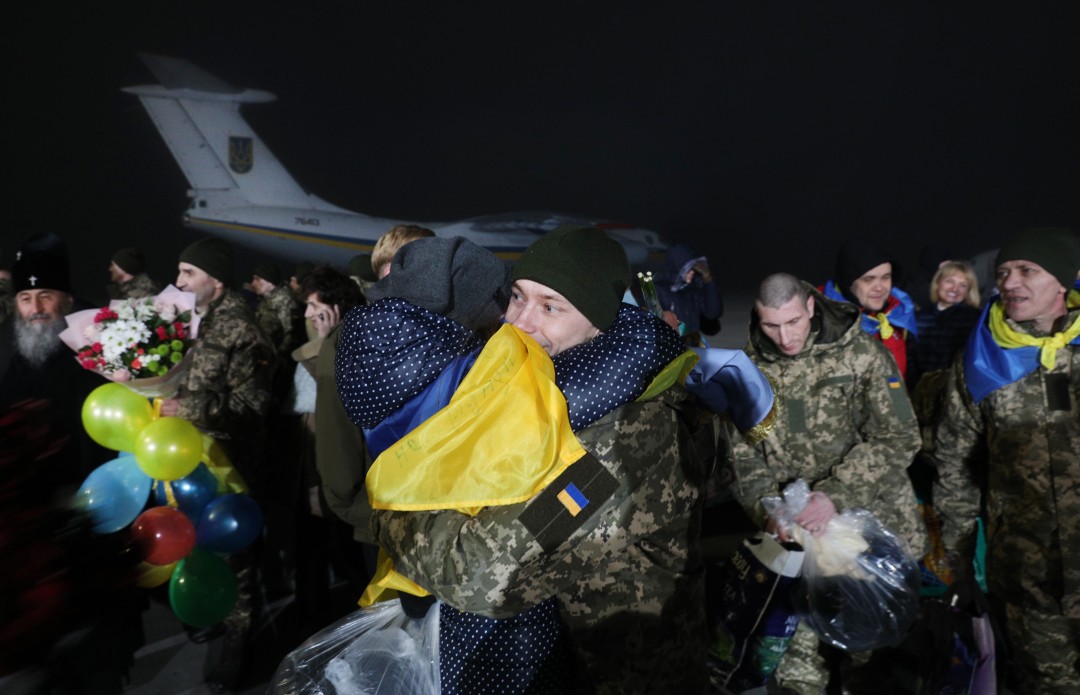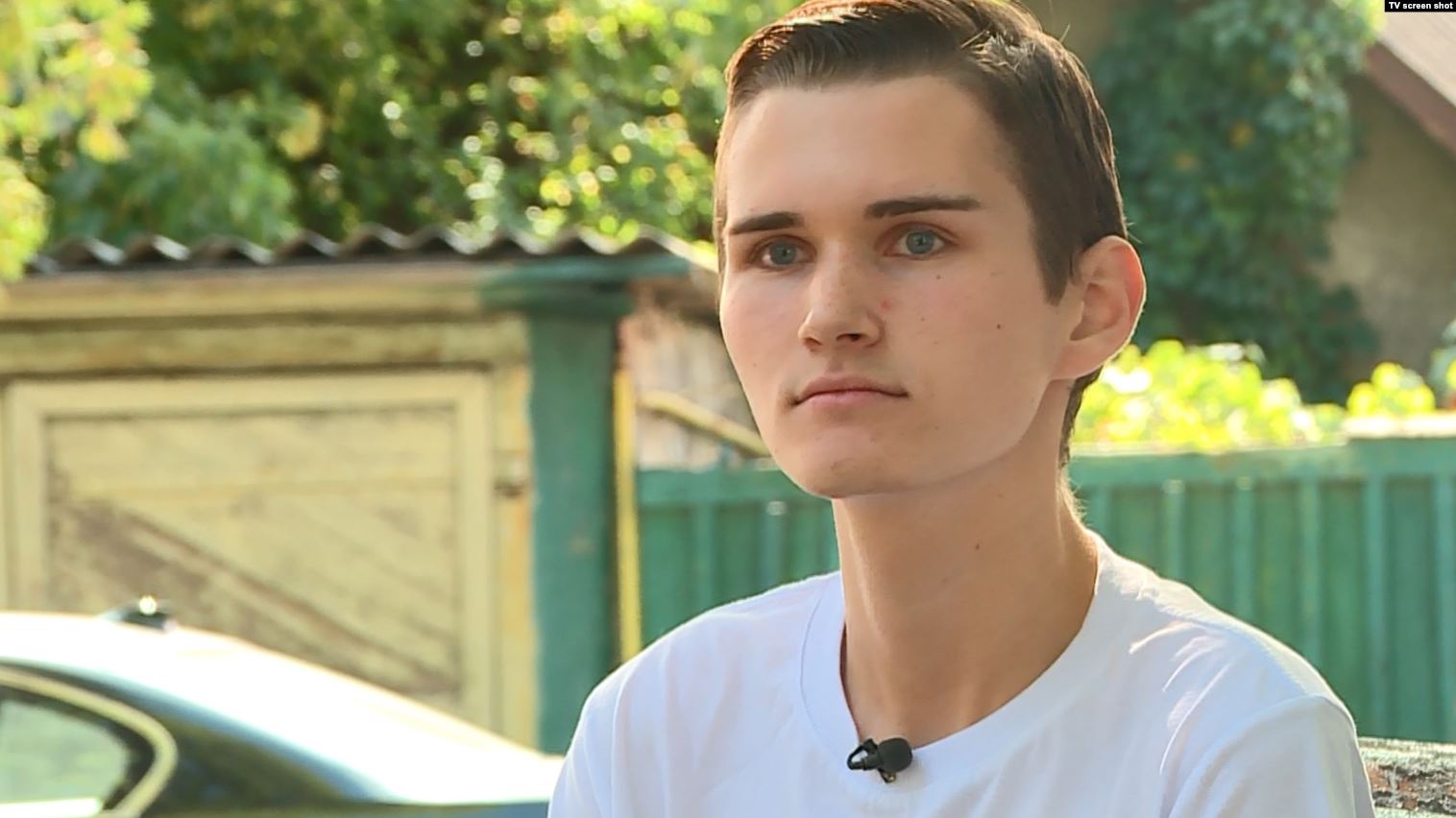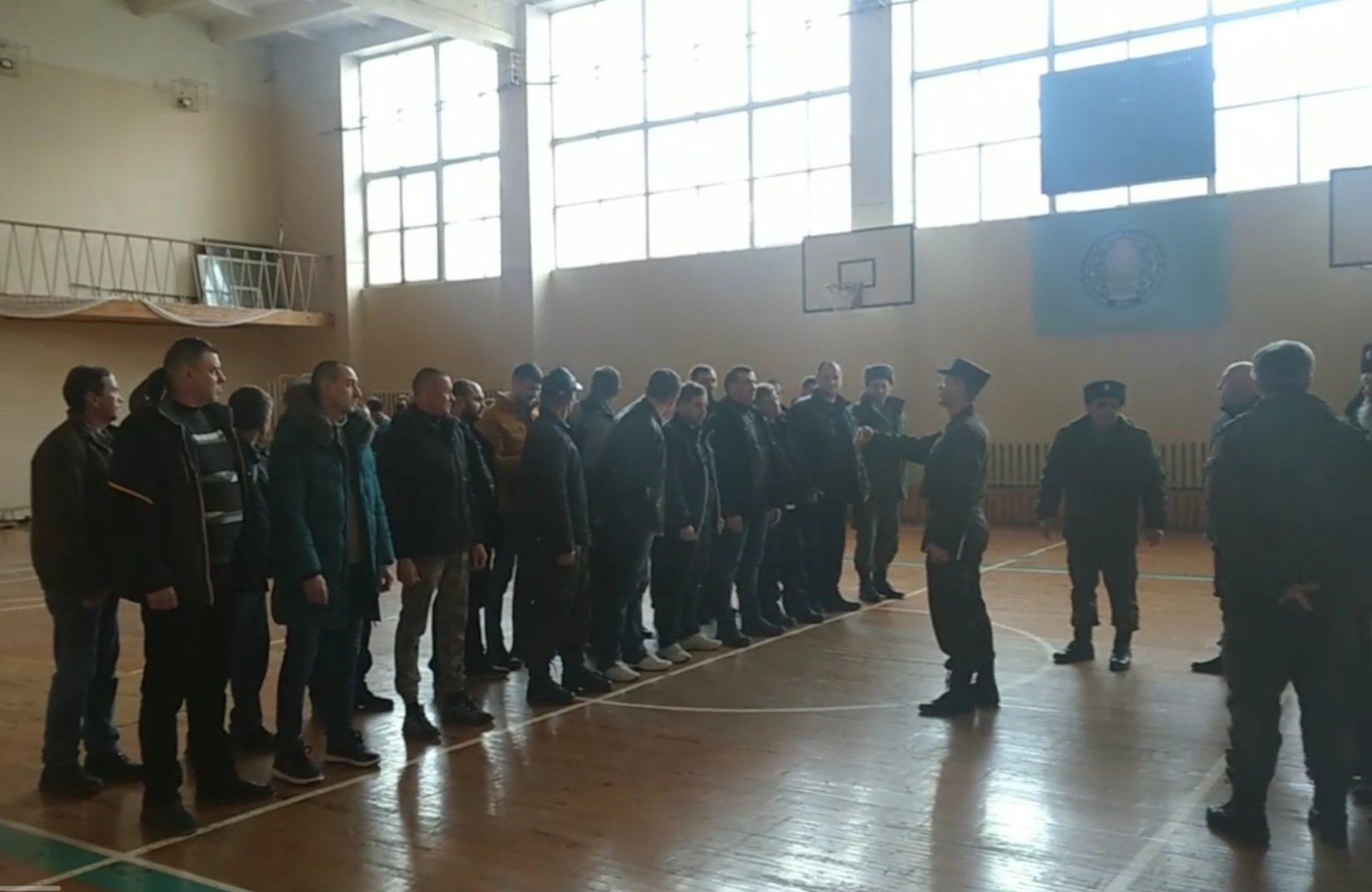Russia had effectively blocked the prisoner exchange process in the Donbas for 15 months from September 2016, when two Ukrainian nationals were released from captivity.
This September Ukraine was ready to release 309 prisoners in exchange for 87 Ukrainian hostages in the Donbas. In early November, the Trilateral Contact Group on settlement in Ukraine (TCG or the Minsk group) has finally approved the prisoner exchange of 74 Ukrainian hostages taken by “LNR/DNR” for 306 persons held in Ukrainian prisons “before the New Year’s Day.”
Read more: Ukraine may swap its 74 hostages in occupied Donbas before New Year
Occupied #Luhansk: another fotage of hostages https://t.co/LfMmwn6iE5 pic.twitter.com/RHbS9cl0BZ
— English Luhansk (@loogunda) December 27, 2017
A footage showing Ukrainian hostages in occupied Luhansk embussing to get to Donetsk Oblast for exchange in the the morning of 27 December 2017.
“On December 27, the hostage release has been conducted in the area of Mayorsk, Donetsk Oblast. Seventy-three those illegally held Ukrainians were freed from prisons run by militants in certain areas of Donetsk and Luhansk oblasts [ORDLO, the official designation of the occupied territories],” said MP Iryna Herashchenko, Ukraine’s humanitarian envoy to the Minsk group, according to the press service of the Parliament.
“First moments of prisoner swap process” pic.twitter.com/teUP8QDM4e https://t.co/UaGVNcRkKb
— English Luhansk (@loogunda) December 27, 2017
The very first moments of the prisoner exchange. Footage: Military TV of Ukraine
Ms.Herashchenko highlighted, “In turn, the Ukrainian side has handed over 233 people from the list of 306 by pardoning them and releasing them from custody.”
According to Ms.Herashchenko, Ukrainian negotiators in the Minsk Group “fought the most severe and tough fight” for the freedom of the servicemen, who had been behind bars in the occupied territory a long time since January-February 2015, when the Debaltseve Battle and the Battle for Donetsk Airport had ended.

One former Ukrainian servicewoman decided to stay with her family in occupied Donetsk, according to the “DNR” sources.
So did 73 prisoners in Ukraine, who chose to stay in free Ukraine rather than move to its occupied territory. According to Ukrainian ombudswoman Valeriya Lutkovska, 43 of them didn’t show up at the swap point because they had served their sentence and had been released from custody earlier, the other chose not to return to the occupied area during the swap process.
The released Ukrainian captives were brought to the Kramatorsk military airfield, where Ukraine’s President Petro Poroshenko and the Minister of Defense Stepan Poltorak welcomed them and flew together with them by helicopters to the northeastern city of Kharkiv, where the planes were prepared for the released Ukrainians to fly them to the capital city of Kyiv.
About midnight, the released Ukrainians arrived in Boryspil Military Airport near Kyiv where they were warmly welcomed by thousands of Ukrainians.
Зустріч Президента зі звільненими заручниками #Зустрінь_Своїх pic.twitter.com/VpUEzxpl0C
— Львівський батяр (@KarpenkoBatjar) December 27, 2017
President Petro Poroshenko welcomes the released hostages in Kramatorsk.
Apart from the President and Defense Minister, Ombudsman Valeriia Lutkovska, MP Iryna Gerashchenko, and Ambassador of France Isabelle Dumont also met with the released hostages.
#Ukraine – The presidential plane with freed Ukrainians on the way from Kharkiv to Kyiv https://t.co/7LkGDjou3p pic.twitter.com/hB2p46yZLp via @STsegolko
— Liveuamap (@Liveuamap) December 27, 2017
German Foreign Minister Sigmar Gabriel called the exchange “an important humanitarian gesture” ahead of Orthodox Christmas and noted, “Further steps to implement the Minsk [ceasefire] agreements should now follow. The successful prisoner exchange shows that this is possible.”
The exchange came as US Secretary of State Rex Tillerson asked Russia to “lower the level of violence” in eastern Ukraine.
While Poroshenko is thanking the Normandy format, the US, the TCG, the OSCE and the other international organizations for the swap, representative of the occupation authorities Olga Kobtseva thanked Russian President Vladimir Putin, KyivPost reports.
Who was released
There are both civilians and the military among the 73 released Ukrainian hostages. Soldiers were taken hostage during the battles, civilians were mostly pro-Ukrainian local residents who reported the latest developments on social networks or just openly showed their pro-Ukrainian position.
Servicemen Oleksandr Morozov and Ivan Liasa were taken captive amid the Battle for Donetsk Airport (2014-2015); two volunteers from Kryvbas battalion, Mykola Herasymenko and Oleksandr Lazarenko have been held behind bars since February 2015 after the Debalseve Battle.
National Guards representative Yevhen Chudnetsov was sentenced by the occupation authorities to 30 years in prison.
Soldiers Oleksandr Oliinyk, Oleksii Kodman, Oleksii Kyrychenko, Oleksandr Kalin were taken captive being wounded during the period from the end of 2014 to the beginning of 2016 during the toughest battles at the frontline.
Another released hostage is 22-year-old contract soldier Valentyn Bohdan from Lviv Oblast captured in 2016 winter.
Among the released civilians, there are 63-year-old religious specialist and academic Ihor Kozlovskyi from Donetsk and a civic volunteer Volodymyr Fomichov who was captured as he visited his relatives in the occupied zone.
Another released hostage is Halyna Haiova from occupied Dokuchaevsk, who worked as a nurse in the city hospital. She was sentenced to 10 years in prison for “espionage.”
Read also: Ukrainian civil resistance to Russian occupation in Donbas
Luhansk football fans Vlad Ovcharenko and Artem Akhmerov who were detained in October 2016 and later sentenced by a Luhansk “court” to 13 and 17 years in prison for “high treason in the form of espionage” were also released, as well as Luhansk blogger Eduard Nedeliaiev.
Released Vladyslav Ovcharenko talking to @poroshenko on the phone. Eduard Nedelyaev in the background https://t.co/6ZDjLph7DE pic.twitter.com/n6090XnQt7
— English Luhansk (@loogunda) December 27, 2017
The next swap
Viktor Medvedchuk, Russian President Putin’s crony who represents Ukraine in the Minsk group, told the Russian TV channel NTV that at the 2nd stage of the all-to-all swap, 74 people will be handed over by Ukraine, the “republics” are going to release 29 Ukrainian hostages. However, the next stage is not approved yet and it will be negotiated in early 2018.
According to the Security Service of Ukraine, citing its head Vasyl Hrytsak, in total, 3,125 Ukrainians have been found and released since 2014, other 103 people remain held hostage in Luhansk & Donetsk Oblasts, 402 are considered missing.
- The Trilateral Contact Group on Ukraine was created after the May 2014 Ukrainian presidential election to facilitate a diplomatic resolution to the war in the Donbas.
- The TCG consists of representatives from Ukraine, Russia and the Organization for Security and Cooperation in Europe (OSCE).
- Prisoner exchanges in the all-for-all format are one of the provisions of the Minsk-2, the Package of Measures on the implementation of the Minsk agreements was signed by TCG on 12 February 2014 in Belarus.
Read more:
- Ukraine may swap its 74 hostages in occupied Donbas before New Year
- Ukrainian civil resistance to Russian occupation in Donbas
- Russian proxy “republic” sentences two pro-Ukrainian football fans to 13 & 17 years
- Who is who in the Kremlin proxy “Donetsk People’s Republic”
- Liberated Crimean Tatar leaders: don’t forget other Ukrainian hostages of the Kremlin
- The dangerous life of pro-Ukrainian activists in occupied Donbas
- EU Parliament demands Russia release 47 Ukrainian de facto political prisoners, urges sanctions
- Afanasyev and Soloshenko: How the FSB breaks prisoners
- Russian judges deny Crimean Tatar hostage last meeting with dying mother
- Ukrainian hostages in the “LNR” and “DNR: The price of life








